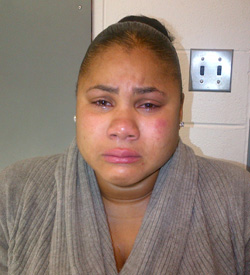During post-crash ambulance ride, woman allegedly adds insurance to wrecked car
Riding in an ambulance after being injured in a car crash, a Philadelphia woman allegedly took her car insurance company for a ride.

Regina White, 23, faces two criminal charges for allegedly calling her insurer shortly after being involved in a four-car crash to add comprehensive and collision coverage to her policy for a 1998 Ford Taurus. Authorities say the call came during Whitehead’s ambulance ride to a nearby hospital after she was injured while driving the Taurus near Philadelphia.
Frank Scafidi, a spokesman for the nonprofit National Insurance Crime Bureau, says this case “gives new meaning to ambulance chasing.”
“Every now and then, investigators catch a nice break from the folks who commit crimes — like a bank robber who uses a taxi as a getaway car then gives his current address as his destination,” Scafidi says.
Authorities say Whitehead filed a claim with her insurer, Infinity Insurance Co., in an attempt to get the damage to her car covered. However, authorities say, she lied to her insurer about when the car crash happened; she allegedly said the wreck occurred after she bought the extra coverage. In fact, authorities say, the crash happened before she purchased the extra coverage.
Court documents indicate Whitehead dropped her insurance claim a day after the wreck.
Before the wreck, authorities say, Whitehead carried liability and medical benefits coverage, which wouldn’t have paid to fix her Taurus. Court records show a friend of White had suggested she buy the comprehensive and collision coverage so that the damage to her $3,500 car would be covered.
In general, anyone who seeks to add coverage for a car right after it’s been in a crash is committing fraud, according to Loretta Worters, a spokeswoman for the nonprofit Insurance Information Institute. Worters says she can’t comment directly on the Whitehead case.
“When someone tries to reduce their own insurance costs by misrepresenting information, honest policyholders wind up with higher insurance premiums,” Worters says. “People who commit this type of fraud may think it’s harmless, but insurance fraud is a crime we all pay for.”
Property and casualty fraud – including crimes involving car insurance – cost insurers more than $30 billion a year, according to Worters. Some of these costs are passed along to policyholders in the form of higher premiums.
“In the wake of the economic recession, there has been an increase in fraud schemes and insurance-related crimes,” Worters says, “and efforts are being stepped up to combat fraud and help lower the cost of insurance.”
